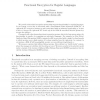Free Online Productivity Tools
i2Speak
i2Symbol
i2OCR
iTex2Img
iWeb2Print
iWeb2Shot
i2Type
iPdf2Split
iPdf2Merge
i2Bopomofo
i2Arabic
i2Style
i2Image
i2PDF
iLatex2Rtf
Sci2ools
153
click to vote
CRYPTO
2012
Springer
2012
Springer
Functional Encryption for Regular Languages
We provide a functional encryption system that supports functionality for regular languages. In our system a secret key is associated with a Deterministic Finite Automata (DFA) M. A ciphertext CT encrypts a message m and is associated with an arbitrary length string w. A user is able to decrypt the ciphertext CT if and only if the DFA M associated with his private key accepts the string w. Compared with other known functional encryption systems, this is the first system where the functionality is capable of recognizing an unbounded language. For example, in (Key-Policy) Attribute-Based Encryption (ABE) a private key SK is associated with a single boolean formula φ which operates over a fixed number of boolean variables from the ciphertext. In contrast, in our system a DFA M will meaningfully operate over an arbitrary length input w. We propose a system that utilizes bilinear groups. Our solution is a “public index” system, where the message m is hidden, but the string w is not....
Boolean Variables | CRYPTO 2012 | Cryptology | Deterministic Finite Automata | Deterministic Finite Automata Dfa |
Related Content
| Added | 28 Sep 2012 |
| Updated | 28 Sep 2012 |
| Type | Journal |
| Year | 2012 |
| Where | CRYPTO |
| Authors | Brent Waters |
Comments (0)

